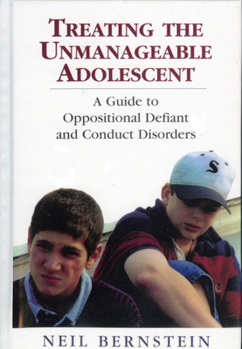Treating the Unmanageable Adolescent: A Guide to Oppositional Defiant and Conduct Disorders
Select Format
Select Condition 
Book Overview
The problem of the out-of-control teenager demands immediate and effective attention from clinicians. As American town after town enacts curfew laws for minors and more and more teachers send youths for treatment, therapists are faced with an epidemic for which they often feel ill-prepared. In this book of nuts-and-bolts treatment approaches, mental health professionals are shown how to successfully help defiant and conduct-disordered young people...
Format:Hardcover
Language:English
ISBN:1568216300
ISBN13:9781568216300
Release Date:November 2000
Publisher:Jason Aronson
Length:368 Pages
Weight:1.30 lbs.
Dimensions:1.0" x 5.8" x 8.4"
Related Subjects
Adolescent Psychology Applied Psychology Behavioral Psychology Behavioral Sciences Child Child Psychology Cognitive Psychology Health, Fitness & Dieting Health, Fitness & Dieting Internal Medicine Medical Medical Books Medicine Mental Health Politics & Social Sciences Psychology Psychology & Counseling Social SciencesCustomer Reviews
2 ratings
Angry, And Perhaps Rightly So
Published by Thriftbooks.com User , 21 years ago
Dr. Neil Bernstein's useful work on the counseling of oppositional teenagers is noteworthy in its humility, for a start. Clinical success, in the author's view, is established the old fashioned way: you have to work for it. In his introduction Bernstein confesses to a basic distrust of quick fixes for teenage problems, particularly those promulgated on the lecture/workshop circuit. He keeps a balanced head on the etiology of oppositional defiance, recognizing that disorders of mood, substance abuse, and dysfunctional families of origin, to name a few factors, must be given their day in court during the diagnostic phase of treatment. He is well read in adolescent development and recognizes that the teen years are inherently about distancing and defiance, in some way, shape, or form. If one were to label the author's clinical approach, perhaps the Rogerian style comes closest to capturing this practitioner's persona. Without losing sight of the nuts and bolts, Bernstein seems to find his success in establishing empathy and trust with his young clients. The "opposition" of teenagers is directed against the systems that they perceive as having failed them: family, school, and the peer community. The defensive attitude of such youth is both a mask for their pain and insurance against further hurt. It is encouraging to see that a lengthy chapter has been devoted to family intervention [though some family specialists will inevitably argue that the family organism is the whole enchilada where childhood disorders are concerned.] Bernstein's clinical examples-and they are numerous-appear to be drawn primarily from individual therapy sessions, i.e., without parents or others in the process. If this reflects the demographics of his paying clientele, then he must have a remarkable gift for developing engagement with his young clients, and he would apparently have enough leisure to plumb his clients' psyches at a pace that does not engender defensiveness. But aside from the wearisome issue of whether managed health care or the client's own limited resources put limitations on a style that calls for protracted contact and trust building, the one nagging question left hanging in this work is the role of the parents in the client's treatment. In Chapter 12 the author provides a substantive commentary on family therapy, noting among other things that parents frequently repeat the mistakes of their own mothers and fathers, implying that many oppositional clients have plenty at home to be oppositional about. Is such therapy without the parents the clinical equivalent of rowing with one oar? I would summarize Bernstein's position on parental participation in therapy as "optimal but not necessary." As a practitioner myself, unless I have compelling reasons to the contrary, I subscribe to the philosophy of the seasoned general who brought a long time rival into his inner circle on the grounds that "I'd rather have him inside my tent [urinating] out than outside my ten
Treating the Unmanageable Adolescent
Published by Thriftbooks.com User , 24 years ago
I've been working with difficult teenagers for over ten years and read this book hoping to gain new insights and skills into working with this population. By far, it is the best book I have ever read on this topic. It is explicit, practical, and offers numerous suggestions for addressing the multiple problems that this population faces. I have found it extremely useful in my practice because of the easily applicable techniques Dr. Bernstein presents, and his concrete suggestions about how to implement them. Dr. Bernstein shares many examples from his clinical practice which parents and clinicians alike should find helpful. Susan Gordon, Ph.D.






